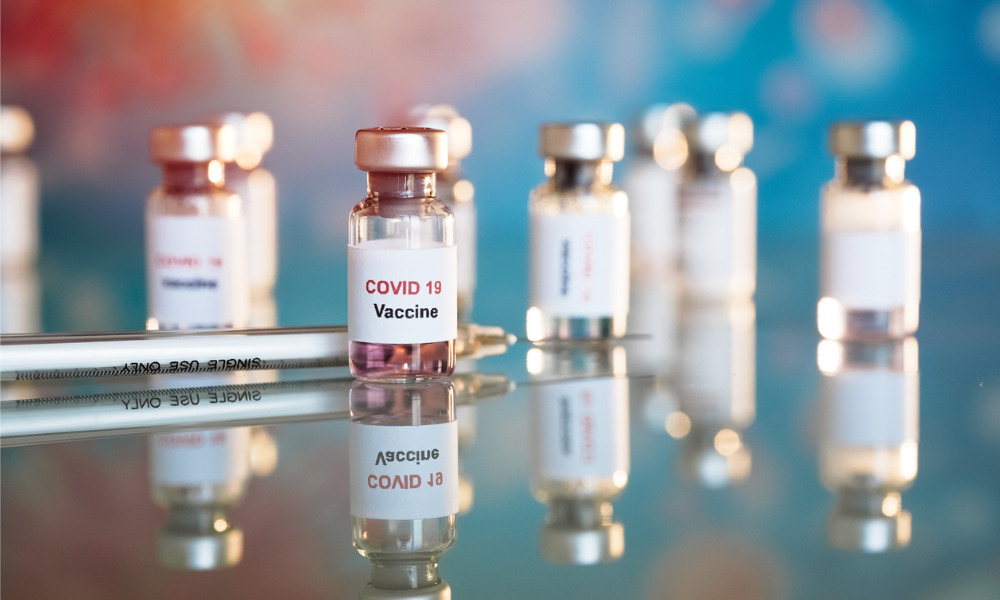
Some countries allow employers to include vaccination as a pre-employment requirement

While scientists are racing to develop a safe and effective vaccine against COVID-19, governments across the world are acting fast to secure enough doses for their citizens.
Canada has unveiled plans to purchase up to 190 million doses, while Australia is already at the ‘top of the queue’ of buyers interested in the vaccine from AstraZeneca and the University of Oxford.
On the other hand, the US has launched Operation Warp Speed, collaborating with at least 18 different biopharmaceutical groups to expedite development.
But given all the recent advancements (more than 150 COVID-19 vaccines are being tested worldwide), even the top infectious disease expert in the US is “cautiously optimistic” about how soon a vaccine would become available.
“It’s not going to be turning a switch off and turning the switch on,” Dr. Anthony Fauci told CNN.
Requiring the vaccine
The speed with which most COVID-19 vaccines are being developed has left some workers feeling suspicious about the safety and efficacy of the final product.
A survey by Reuters/Ipsos, for instance, found that people who weren’t interested in immunisation were also most concerned about how quickly the vaccine would be approved (48%) and how the risks outweigh the benefits (42%).
For those willing to get vaccinated, however, many would consider whether:
In a similar Gallup poll, a third of respondents said they would decline the offer of a vaccine even if it were FDA-approved and offered at no cost.
Despite early opposition, vaccination remains one of only a few easily scalable options to safeguard communities and workplaces from the novel coronavirus.
Read more: Is it too dangerous to bring staff back to the office?
Should leaders then make COVID-19 vaccination mandatory?
In August, Australian Prime Minister Scott Morrison drew criticism for suggesting workers could face such requirements. He later backtracked and stressed there would be no compulsory vaccines.
Dr. Fauci also warned against any government move requiring the general public to get vaccinated. There is a caveat: “You can mandate [vaccination] for certain groups of people like health workers,” he said. “But for the general population you can’t.”
Countries like the US allow private employers to include certain types of vaccination as a pre-employment requirement. Hospital and nursing home staff, for instance, are required to get an influenza shot each year given the nature of their work.
“Private employers have significant flexibility for requiring vaccination. Yet few businesses outside of health care facilities have done so, partly out of fear that employees would consider these policies to be unacceptable invasions of their personal lives,” says Debbie Kaminer, a law professor who has written extensively about vaccination laws and employment discrimination.
“There is a risk in a unionised workplace that a mandatory vaccination policy could be struck down if it violates a collective bargaining agreement,” Kaminer writes.
“Employers may also be concerned that if policies do not include significant religious exemptions, workers could sue, claiming religious discrimination,” she says. But it is unlikely that federal law would force employers to accommodate calls for religious exemption in the context of a pandemic.
Another law professor, Dorit Reiss, shares similar views. As an expert in vaccination laws, Reiss recognises how employers could face resistance while striving to prevent outbreaks at work.
However, “legally every employer can require [vaccination] – you don’t have to be a high-risk employer to require it,” Reiss told USA Today.
Australia is likely to see similar workplace regulations taking effect in light of the pandemic.
“There is a strong case for requiring particular workers (for example, those in aged care facilities) to be subject to mandatory vaccinations,” says human rights lawyer Maria O’Sullivan.
“However, many other workplaces in Australia may also require COVID-19 vaccination certificates under Occupational Health and Safety policies,” she says.
Read more: Is COVID-19 a workplace injury?
Which sectors should be vaccinated?
As Dr. Fauci points out, there’s still a long way to go before researchers are able to go to market with a medically-certified safe and effective option.
But the US Centers for Disease Control and Prevention has already recommended prioritising essential workers and high-risk groups first, once a vaccine becomes available. These include up to 20 million hospital and care home employees, and emergency medical service workers and public health workers.
The CDC also called for up to 80 million workers in the following sectors to be vaccinated:
Workers with certain medical conditions – such as cancer, kidney disease, pulmonary disease, heart ailments, obesity and Type 2 diabetes – who are at a higher risk of contracting severe COVID-19 may also require immunisation, the CDC said.
As the global pandemic continues, there is also the risk of a vaccine shortage in the first year of immunisation. Experts predict only one in 10 will get vaccinated by 2021.
“It clearly is not too early for employers to be carefully evaluating their options,” advise Barry A. Hartstein and associates at the employment law firm Littler.
But requiring employees to get immunised, quickly after a vaccine hits the market, may have its own drawbacks, they write.
Despite the “sense of urgency” in securing a safe and effective COVID-19 vaccine, employers need to be aware that there will be significant delays until a vaccine is available for all.